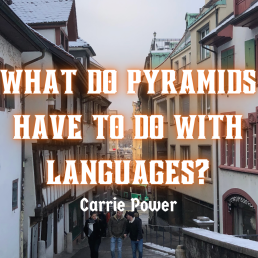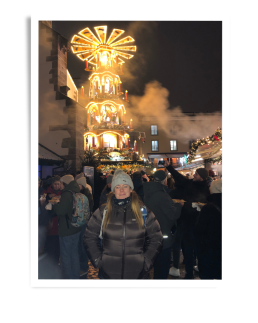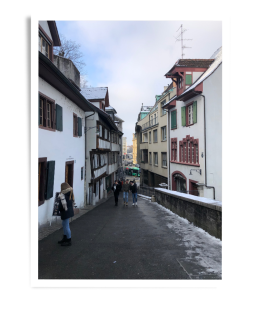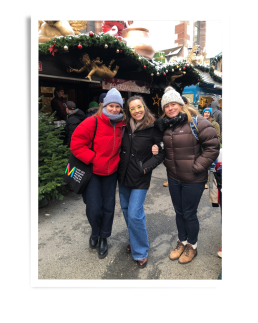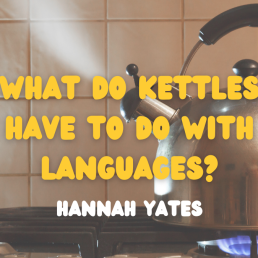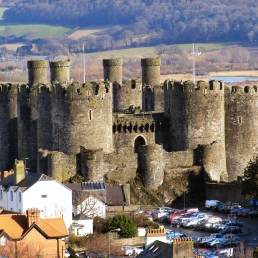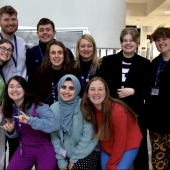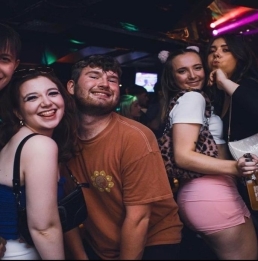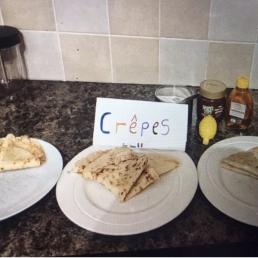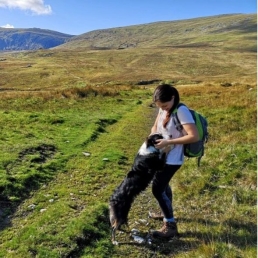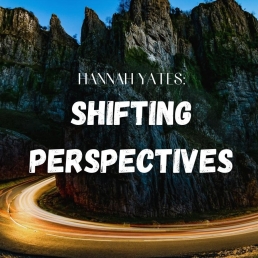What do Swiss pyramids have to do with languages?
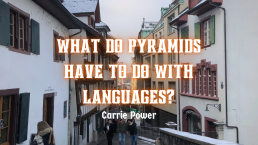
I’m sat on the train heading to Basel from Geneva, when I notice the announcement and the information board inside the train is now in German. You may not know that Switzerland has two *official languages – French and German. The Röstigraben (Der Röstigraben in German or the barrière de rösti in French) is an invisible barrier between French-Speaking Switzerland and German- speaking Switzerland. But it’s not just the languages that are spoken in both areas that are different. The politics and traditions are also different. As the train makes it way towards Basel, I look forward to the chance to practise my German for the day.
I’m visiting Basel as part of a trip with the *Erasmus Student Network (ESN) run by students from Geneva University. The train ticket cost 15CHF (£13.37) which is a lot cheaper than normal train travel in Switzerland! I arrive at Geneva station at 6:40am on a freezing cold Saturday morning and make friends with two students from Geneva University. Laura is from Belgium and Soraya is from Germany and we spend the three-hour journey getting to know each other.
Once we arrive at Basel station, we get a group photo and are left to explore the city. We head to the nearest coffee shop to get a hot drink. Afterwards, we visit Bider und Tanner, a very popular independent bookstore that is a *bookworm’s paradise with a wide selection of books in different languages. Whilst reading the *blurb of a German novel, I overhear one of the booksellers speaking Swiss German to a customer and enjoy listening to its beautiful sound, even though I don’t understand it.
We then make our way to the beautiful old town with its impressive views over the river Rhine and enjoy lunch at a pizza restaurant. Following lunch, we spend our time visiting high street shops as well as the wonderful German Christmas market. Here, we find lots of wooden huts selling anything and everything from Glühwein (mulled wine), Bratwurst (fried sausage), and flavoured nuts, to dream catchers, jewellery, and dog treats! The atmosphere is full of fun and festive cheer, you can see that people are really enjoying being out and about after two years of Covid disruptions.
One of my personal *highlights of the Christmas market was seeing the huge Weihnachtspyramide (Christmas pyramid) as it reminded me of my dear German nan who handed down a normal-sized one to my dad, and then to myself. It’s a wonderful, traditional Christmas decoration with carefully crafted wooden pieces on different levels of a carousel. Each level has a different nativity scene. The flames from the special candles that surround the bottom of the carousel power the *propellers that make it turn.
Leaving behind the busy Christmas market, we make our way back to the station after a long and cold day exploring the beautiful city of Basel to catch the train back to Geneva.

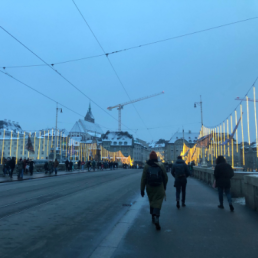
Vocabluary:
*official languages – languages that are recognised by the law of a country
*Erasmus Student Network (ESN) – a student network that supports international student exchanges
* CHF – this stands for Swiss Franc, which is the currency used in Switzerland
* bookworm – someone who loves to read books
*blurb – the short description on the back of a book/DVD
*Rhine – a river that flows through Switzerland, Germany and the Netherlands.
*highlight – the best bit of something
*propeller – a device made up of spinning blades that help move things through water/air
What do kettles have to do with languages?
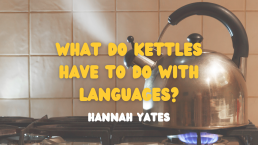
Buongiorno a tutti!
So, I’m back in the UK, and I’ve had a chance to think about my time in Italy. Today I’ll be talking about one really *memorable moment: teaching a 23-year-old Italian man how to turn a kettle on!
I already knew that kettles weren’t common in Italian homes, but I hadn’t realised just how alien the idea of a kettle is to Italians.
So, why do we use kettles and Italians don’t? I decided to do some research into the *origins of the kettle to find out!
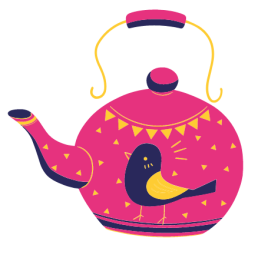
First of all, the word ‘kettle’ comes from the Old English* word ‘cetil’, and it can be traced all the way back to the Latin word ‘catillus’, meaning a ‘deep pan or dish for cooking’ (OED, 2022).
There is evidence that kettles were being used, even before the word itself was created! For example, *archaeologists have found a bronze vessel* used to boil water that dates back to *3000BC!
Different sorts of kettles became popular in different places around the world as water was boiled to make it clean. Iron kettles were most common as travellers, soldiers and families would use these to cook food and boil water (Aqua Libra, 2020).
However, in *Ancient China, people would improve the flavour of water by adding tea leaves, which resulted in the creation of tea!
As this tradition became more common in Chinese culture, porcelain* kettles were made specifically to make tea with (In The Kitchen, 2017).
The British were influenced by these traditions and our love for the kettle comes from our *obsession with tea.
When tea was first brought to Britain from Asia in the 17th century, it was only drunk by the richest people in society. But, as time went on, tea became more available, and so did the equipment used to make it. So, by the late 18th century, copper kettles had started to appear in British homes.
In the 20th century, the stovetop kettle arrived in British homes, along with the whistling kettle, which would let out a *piercing noise to let you know that the water had boiled! Eventually, these kettles were replaced by the modern electric kettle, which is what most of us use today.
So why didn’t kettles become popular in Italy? Because tea itself never became popular!
Italians love coffee and coffee culture, which has grown more and more popular ever since coffee first arrived in Venice in the 17thcentury.
At the start of the 20th century, the strong coffee known as espresso was invented in Milan, which lead to the creation of the first coffee bars that you can now find all over Italy (Neighbourhood Coffee Roasters, 2022).
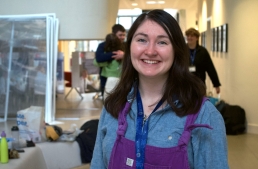
So, while we Brits were boiling water for tea in kettles, Italians were making strong coffee in moka pots*, which could be used on a stovetop much like a traditional kettle in the UK.
A kettle may be a rare sight in Italy, but I’ve yet to visit an Italian home without a moka pot or an espresso machine.
With all this in mind, should I really be surprised that a fully-grown Italian man could not work an electric kettle? Let me know your thoughts in the comments.
Vocabluary:
- Memorable: something that’s easy to remember because it is/was special or unusual
- Origins: where something comes from
- Old English: The earliest recorded form of English, used up until around 1150
- Archaeologists: someone who studies history by digging up and studying remains
- Vessel: A container, especially one used to hold liquid
- BC: Before Christ
- Ancient China: A very old civilisation
- Obsession: when something or someone is always on your mind
- Piercing: very loud
- Porcelain: More commonly known as ‘china’, named after where it originated
- Moka pot: A stove-top coffee maker, invented in Italy (https://en.wikipedia.org/wiki/Moka_pot)
School Profile: Ysgol Aberconwy
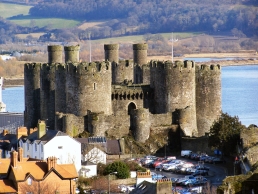
Ysgol Aberconwy, Jamie McAllister
Medium: English
Location: Aberconwy
International Languages: French, German, Spanish
Curriculum for Wales: A reflection on our first project
In the last four years, I have jumped on the Conti bandwagon and introduced EPI and MARS-EARS to my department.
Inspired by his and Smith’s book ‘Breaking the Sound Barrier’ (which was a game changer for me), we have seen a noticeable improvement in engagement in KS3 lessons, but sadly no impact on KS4 uptake.
So, when we started planning for the new curriculum, we decided we would tackle attitudes to language learning with year 7 before actually getting stuck into our International Languages themselves.
Controversial, but the beauty of the Curriculum for Wales is that it has given us the freedom to address learning needs in our individual school context.
Our numbers are declining despite any initiatives we embrace or any pedagogical changes we make, so we felt it was time to implement something completely different.
Initially inspired by the website We Are Multilingual, we based our key concepts for our first project on these themes:
- Am I multilingual?
- What is body language?
- I am what I speak
- What is culture?
- Why am I learning a language?
We used and adapted the resources on the website and when planning the project, we considered our geographical location: Conwy, North Wales.
To build authentic experiences into our lessons, we took our learners to Conwy town so they could conduct a survey with the public on their attitudes to language learning and multilingualism.
Our learners really enjoyed the experience, met many linguists first-hand in the popular tourist town, and were able to develop their social and oral skills in a real-life situation.
For us that was a step in the right direction towards creating ambitious, capable, confident, and informed learners.
Yes, I do worry that we haven’t done any specific International Language teaching for a whole ten weeks, but we remain hopeful that the work we have done so far will go some way to developing an attitudinal shift in our learners towards the value of having language skills.
Something that they currently overlook and massively undervalue.
With the introduction of any new curriculum there are going to be teething problems and reviewing our first project there are of course several things we will do differently next time.
However, in terms of value in our own school context, we as a department feel it has been time well invested.
Our first 2023 training weekend!
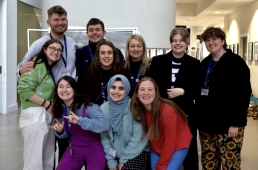
Well, what a weekend we’ve just had! Another training weekend successfully completed, and we can’t stop beaming about the entire experience – the people we’ve had the privilege to meet, the fascinating conversations we’ve had, and the overall atmosphere of joy among our mentors!
In total 44 trainee mentors joined us in Cardiff for two days in order to learn more about MFL Mentoring and what it means to be part of the project, learning from some of our incredible current mentors, who played an integral role throughout the training weekend.
‘Sharing diverse ideas’
It’s always exciting to meet a new intake of mentors, and this training weekend was no different. Joining us from Aberystwyth, Bangor, Wrexham Glyndŵr, Swansea, Cardiff and Cardiff Met, we knew this would be an interesting weekend before we even began!
Usually, our training weekends are held in different locations across the country, but this weekend saw them all come together from across Wales, allowing us to work with our new cohort of mentors in one big group.
As always, one of the best parts about meeting the mentors was finding out more about who they are and what motivated them to get involved with the project.
With mentors from almost every corner of the globe, from Wales and the UK, to India, Poland, China, Spain, Vietnam, Cyprus, the Philippines, and so many other places in between, it’s a rare and wonderful opportunity to have so many individuals from different cultural and linguistic backgrounds all together in one place.
The feedback we had from one of our mentors after the event sums this up perfectly: ‘I didn’t expect a lot of people from different cultures to be in one space and sharing diverse ideas. I loved that and enjoyed the company of such lovely people!’
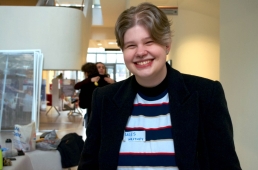

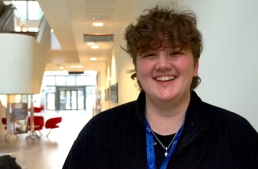
The mentors are also studying such a wide array of different subjects, from language courses to subjects including marketing, business, zoology, song-writing, law, comics, and criminology. It’s inspiring to see people with such varied backgrounds and specialities come together and find commonality over their shared love of languages.
We also couldn’t be prouder of our current mentors who came into their own over the course of the training weekend, working hard and taking the reins in the training of the new cohort.
We were lucky enough to be joined by mentors Alice, Dom, Firial, Elliott, Hannah, Jacob and Jules all weekend. From start to finish, they set a perfect example of everything an MFL Mentor should be, which is particularly impressive when you consider some of them only began their mentoring journey with us back in September!
‘It’s not that you can’t find a language you like. It’s that you haven’t found a language you like yet...’
Over the weekend, the mentors learnt first-hand from the project team about what the role of an MFL Mentor entails and took part in practical hands-on activities with our current mentors, covering topics including mentor skills and qualities, safeguarding in schools and an interactive ideas fayre.
In one of the activities, where mentors discussed how to respond to negative attitudes surrounding languages in schools, there were some particularly brilliant responses.
Hypothetically responding to learners who didn’t want to engage with international languages due to their dislike of learning Cymraeg, one group had the following advice: “You need to think of languages a bit like sports. You might not like one sport, but you might find that you enjoy another completely different sport with different rules.”
Another great response to this from another group was: “It’s not that you can’t find a language you like. It’s that you haven’t found a language you like yet.”
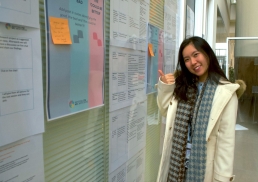
We also encouraged mentors to reflect on their multilingual selves, asking them to visualise different aspects of their multilingual identities by placing sticky notes on a world map.
Again, it was amazing to see how much everyone had in common despite their different backgrounds.
No matter where in the world they’re from and what course they’re studying, our mentors all share a common bond of being multilingual individuals, and are enthusiastic about sharing that part of themselves with learners across Wales with the hope of inspiring them to pursue their own multilingual journey.
Over the course of the weekend, we also asked our trainee mentors to answer some questions for us that we could potentially use their responses in future resources.
When asked what language they would love to learn one day, one of our mentors replied: “Punjabi, because my family speaks it but I never learnt it myself.”
Similarly, in response to the same question, another mentor replied: “Gaelic, because it’s a lost language in my family and I love how it sounds.”
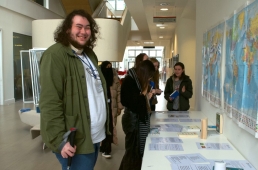
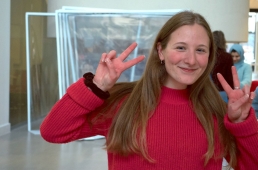
Although answering with two different languages, the sentiment shared between these two mentors is the same – reclaiming a part of their identity that has been taken away or lost.
This might be something they’ll be able to tap into with their learners too, given the different attitudes towards Cymraeg in different parts of the country.
Next steps
We are currently allocating schools as we speak, which we do based on who we think will be a particularly good match for each school on a case by case basis.
We can’t wait to see where our mentors end up and what the future holds for them after such a wonderful training weekend!
Now that they’re part of the MFL Mentoring family, we’re looking forward to getting to know them more and finding out more about their time with learners.
And who knows, hopefully some of them will return later this year to train future mentors….
From the mentor's mouth: Jacob Franklin
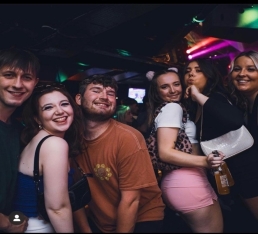
About Me
Hello, Ciao, Shwmae! My name is Jacob, and I’m 19 years old. I’m originally from a small town called Flitwick in Bedfordshire (*the sticks), around 35 minutes from North London.
I’ve lived in Cardiff since September 2021, when I joined Cardiff University to study Italian and Music*(BA). An interesting fact about me is that I completed my grade 8 singing exam when I was 18 as the UK was coming out of lockdown.
Growing Up and School
I’m from one of the few counties in the UK which doesn’t follow the traditional Primary and Secondary school system. Instead, it is Lower, Middle, and Upper School. This means, Lower School (Reception to Year 4), Middle School (Year 5-Year 8), Upper School (Year 9-Year 13).
Lower school was where my *passion for music began, and middle school was where my passion for languages began.
I had trumpet lessons from the age of 8-17 (completed grade 6), and I started singing lessons from the age of 9 which I continue with today with my incredible singing teacher Buddug, who has taught me since I started university. I also had piano lessons from the age of 14-18 so I have a good understanding of this instrument too.
When it comes to languages, I started learning French regularly in year 5 and Spanish from year 9 when I hit Upper School. I absolutely loved studying French and Spanish at A Level.
I was incredibly lucky in my Upper School that I could take *immersion trips to Rouen in France and Malaga in Spain every year.
I completed these trips from the age of 13-17 (I remember coming home mid-March 2020 from Malaga just before the lockdown!).
Honestly, I would say these immersion trips, living with Spanish and French families who didn’t speak English, were some of the best experiences of my childhood. I learnt so much about myself and it really boosted my confidence whilst also opening my eyes to different cultures around the world.
I first went to Spain in March 2017 at the age of 14, when I’d only been learning Spanish for 6 months and I remember feeling so proud of myself going through such a *daunting yet exciting experience. And of course, making so many funny mistakes with my Spanish.
For example, I remember one day I was unsure whether to wear my coat and I asked my Spanish Madre (mum) if it was hot outside. Rather than using the word ‘calor’, I used the word ‘caliente’, if you’re a Spanish speaker, I hope you’re finding my mistake funny right now!
Sometimes, there are lots of different meanings for words and it’s important to make sure we use the right one!
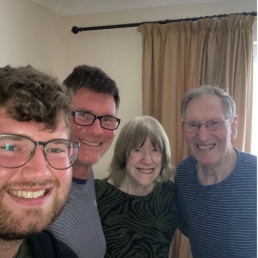
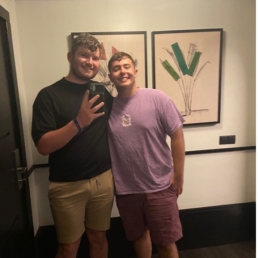
Languages and Me
I speak English as my first language and I’m learning Italian at university, this means I’m going to live in Italy next year-I’m so excited!
I’ve already mentioned that I studied French and Spanish at A Level, so I feel pretty confident speaking both of these languages too (I’m perhaps most confident speaking Spanish as I absolutely adored studying it at school).
You may be wondering as many people do “erm Jacob, why are you studying Italian now?”.
Firstly, I’ve always wanted to learn Italian but very few schools offer it as a subject. Secondly, I wasn’t interested in continuing with French, so it was between Spanish or Italian.
When looking for universities most of them offered music with either French, German or Italian due to the links between music and these languages.
For me, the combination of Italian and Music works beautifully and so it was clear it was time to start my Italian journey! I still get to speak Spanish occasionally with friends I have made through social media and my Spanish journey will never be over because I’ve developed such a love for the language over the years!
As a *classically trained singer, I have sung my *recitals over the years in German, French and Italian and I also now get to sing in Welsh with my singing teacher. I am currently learning the piece “Cân Yr Arad Goch” by Bryn Terfel which I’m really enjoying.
Speaking of learning Welsh, I’ve completed a 10-week Welsh course with Cardiff University, and I’d love to learn more one day (when I have more time to learn it!).
My Student Life and Future Me
So far, I’ve absolutely loved my time at university, and I’ve made life-long friends and met my amazing boyfriend Dom, who studies French and Spanish here too.
Aside from my degree, university has given me so many opportunities such as volunteering. A few months ago, I had the opportunity to volunteer with Speech Therapy for the Welsh organisation ‘21-Plus’, a charity which supports families with children and young people with Down’s syndrome.
I think it’s so important that everyone’s voice is heard, and as a languages student my communication skills and love of people meant that I couldn’t miss out on this opportunity.
Hopefully, one day I will study a *masters in Speech and Language therapy or Music therapy with the skills I have learnt at university.
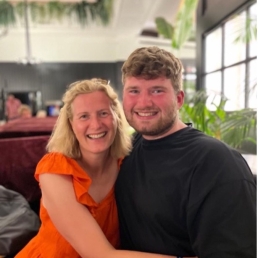
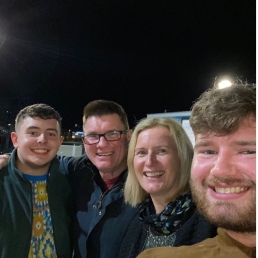
Words:
- BA – Bachelor of Arts is a university degree course
- the sticks – far from anywhere
- passion – great interest
- immersion trip –time spent in another country speaking another language
- daunting – feeling nervous or worried about something
- classically trained singer – someone who has been taught to sing using classical music such as ‘Ave Maria’
- recital – a musical performance
- masters – a course that can be studied after finishing a university degree
What do ladders have to do with languages?
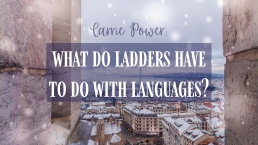
The night of the 11th – 12th of December 2022 marked 420 years since a historic battle between *Protestants and *Catholics in Geneva.
To celebrate the Genevoises (people from Geneva) defeating the Catholic soldiers, a yearly festival called ‘La Fête de L’Escalade’ takes place with a weekend full of events across the city.
At dusk, on a bitterly cold Sunday afternoon, I watched just some of the activities that celebrate one of Geneva’s oldest traditions.
There was a *procession organised by the city’s historical *re-enactment group with men, women, and children led by groups of drummers and *flautists.
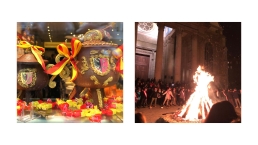
People paraded on horseback or on foot, wearing historical costumes. They proudly carried flags with the *coat of arms of Geneva, fire-lit torches, *muskets, and ladders.
Although a ladder may sound strange, the festival name ‘L’Escalade’ comes from the French verb d’escalader (to climb), and the ladder represents the attacking troops who used ladders to climb the city walls.
Throughout the city centre, there were lots of stalls selling mulled wine (‘vin chaud’ in French and ‘Glühwein’ in German), roasted chestnuts (‘marrons chauds’ in French and ‘geröstete Kastanien’ in German), and bread with a special type of melted cheese called ‘raclette’ drizzled on top.
Keeping with the theme of food, all the supermarkets in Geneva sell a *cauldron (‘une marmite’ in French, ‘ein Kessel’ in German) made of chocolate which celebrates the moment a brave Genevoise cook called Catherine Cheynel threw a boiling cauldron of soup over one of the attackers! The cauldron represents the *resistance and the courage of the Genevoises.
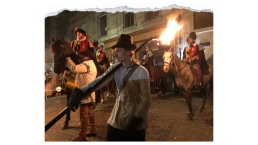
The parade itself wound its way through the packed streets and lanterns were handed out to children.
The procession finished outside the cathedral where the choir sang ‘Cé qu’é lainô’ (He who is high), the hymn of Geneva in the local *dialect called Arpitan, which sounds a lot like the British national anthem ‘God Save the Queen/ King’.
The hymn, composed after the battle, has 68 verses and tells the story of L’Escalade and the victory of the Genevoises over the Savoyards (the Catholic troops of the *Duke of Savoy).
A bonfire was lit outside the cathedral where a large crowd formed. It was here that I met Alma and Mathias, a married couple who live in Geneva.
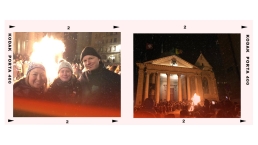
Together, we watched young men with red and white *sashes, joining hands and forming a circle around the bonfire to sing the Picoulet, a folk song dating back to the Middle Ages. It is well known around French-speaking Switzerland and sung during festivals. The Picoulet is a fun song, where a group of men stand in a circle dancing and singing about different parts of the body, like fingers, hands, and elbows…it was a great way to keep them warm during the festival!
Whilst in Geneva, it has been really lovely to have the chance to see such an important local festival which offers lots of fun for all the family.
Vocabulary
Protestants – people who follow Protestant churches, who broke away from the Catholic church in the Middle Ages (from the late 5th century to the late 15th century)
Catholics – people who follow the Catholic faith and are led by the Pope
procession – a parade or march
re-enactment – acting out an event from the past
flautists – people who play the flute
coat of arms – a design used on items such as shield and flags
muskets – a type of gun, fired from the shoulder
cauldron – a large metal pot for cooking over an open fire
resistance – to refuse to accept or go along with something
dialect – a type of language that is specific to a region or group of people
Duke of Savoy – Charles Emmanuel I was the leader of the Duchy of Savoy which used to be a country in Western Europe
Sash – a long strip of material worn over one shoulder or around your waist
Link to Cé qu’è lainô – YouTube which sings 3 of the 68 verses of the hymn of Geneva.
Link to Lyrics of Cé qu’è lainô | Ville de Genève – Site officiel (geneve.ch) in Arpitan and English.
Link to Cortège de l’escalade avec le “Le Picoulet” – YouTube from 2015. The song starts at 5 mins.
Link to La Fête de L’Escalade website (in French): Accueil – Compagnie de 1602
Cauldron photo credit: https://cuisinehelvetica.com
School Profile: Whitmore High School
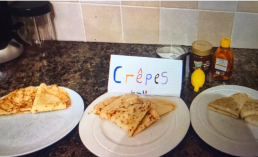
Whitmore High School, Angharad Williams
Medium: English
Location: Barry
International languages: French, Spanish
About our school
At Whitmore High School International Languages department, it has been an exciting first half term.
As teachers, it can sometimes feel that we are forever planning ahead. However, where uptake into KS4 and KS5 is concerned, at WHS, this is essential to the Global Futures mission as well as our own learner uptake.
There can be many challenges to securing strong uptake in IL and we are fortunate at WHS to have both French and Spanish thriving with several classes in both languages at KS4 and KS5.
Whilst we are always seeking to engage our pupils in IL, during the latter part of the autumn term we will host a variety of activities to specifically inform Year 9 and Year 11 learners about what languages can offer them both in school, as a qualification and for their future careers and lifestyles.
MFL Mentoring and our school
MFL Mentoring and our school
We were very grateful to once again be selected to receive a Cardiff University MFL mentor.
Last year, due to Covid, our mentor joined us virtually for live sessions, which worked very effectively, but we are even more excited to have a mentor visiting us and talking to our learners in person this term.
In addition, all learners in Year 9 will receive a GCSE style taster lesson, aimed at showcasing how much language they already know and removing any fear about the jump to GCSE.
In a similar way, Year 11 linguists will receive AS taster lessons where we will explore the different cultural topics studied.
We will also be hosting reward breakfasts within the department for learners who have displayed excellent effort this term. We will make sure parents are informed so that they can join us in celebrating their child’s success.
Activities and languages
In other news, we were thrilled to welcome Miss. Xin Li to our department, our inaugural Chinese Language Assistant.
Miss. Li has quickly settled into our school community, and we have been delighted that she is willing to work not only in delivering Chinese lessons within the International Languages Department, but also in supporting whole school initiatives such as wellbeing and additional needs provision through cultural workshops in the art of Chinese paper folding and Tai Chi.
We are looking forward to developing our learners’ Chinese language skills and cultural awareness as the year progresses and would strongly recommend other schools to consider whether they may benefit from taking part in the programme in future years.
Our IL department believes in collaborating as widely as possible and we are fortunate to have an IL lead practitioner for our local consortium (CSC) as a member of the team.
CSC can offer a range of opportunities and we were delighted to be selected to receive funding for the EPI Conti project working with 20 other schools cross-phase in order to explore new pedagogies, which seems more relevant than ever due to the implementation of the Curriculum for Wales.
Finally, we decided to keep our European Day of Languages challenge virtual this year, due to its great success during Covid restrictions.
This allowed learners to take part in longer challenges at home, with many opting to bake or create masterpieces.
Winning entrants received certificates and languages themed stationery and as you can see from the photos, they enjoyed eating their entries!
From the mentor's mouth: Sara Bariselli
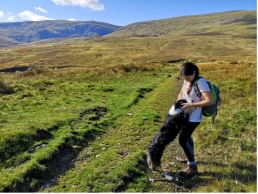
About me
Hello/Ciao/Shwmae/Hallo/Hola/مرحبًا! My name is Sara, I’m 28 years old, and I’m an Italian *PhD student at Bangor University.
I come from a small village at the foot of the Alps, in northern Italy. I’ve always enjoyed meeting new people, and I think that being able to speak different languages is a big part of this.
I have friends from all over the world and even in Bangor I have the chance to use three different languages when I speak with friends and colleagues!
Sometimes I wake up in the morning and I start mixing languages in a sentence. I think I’ve said something that makes sense, but when my partner looks at me in a funny way or starts laughing, I realise I’ve muddled up my languages again!
I’ve been living in north Wales for 2 years now, and I love it!
My take on school
Gianico, the Italian village where I’m from, is very small and until I was 14 years old, me and my friends all went to the same school.
When we started comprehensive school, suddenly we were in a much bigger building, in a bigger town, with students and people from the whole valley.
I had no friends in my new class at first, but eventually I managed to find my place. I went to a secondary school, but I was lucky to study subjects like Latin and Philosophy there as this isn’t always possible.
The school system is different in Italy, and you don’t have the same freedom to choose what subjects you want to study.
When you’re 13, you must decide which school offers the subjects you enjoy most, and your subjects then don’t change for the next five years unless you move to another school.
I always loved school. I think I was a bit of a nerd. In fact, I think I still am!
Gianico, Lombardy:
I’ve always been fascinated by ‘new’ things and love learning things about people and nature. My favourite subjects in school were science and history.
I was always homesick when I was younger, to the point that I wouldn’t stop crying at bedtime if I wasn’t in the same place as my mother (until I was about 12!).
My family was so surprised when I told them that I wanted to apply for a scholarship* to spend a year studying in Ecuador* when I was 17! Nobody believed I could do it, but it was the best decision I’ve ever made.
Languages and me
Obviously, my first language is Italian. I’m also proud to speak my local dialect*, a language that is now disappearing and younger people easily forget that dialects link us to our humble farming history.
I’m also fluent in English and Spanish, decent in French and I’ve also started learning Welsh since I moved here!
I learnt Spanish during my exchange year in South America and I know French as my nain grew up in France, and I also studied it in secondary school.
I know bits and bobs of other languages, just a few sentences that I like to use when I travel. There are many more languages on my ‘to learn’ list: Portuguese, Esperanto*, getting back on track with learning Arabic, Scots Gaelic… the list is never ending!
I’ve had a bit of a tricky relationship with German. I’ve tried to learn it, but it simply doesn’t stick in my head for some reason.
In general, I think the most important thing isn’t how fluent you are in a language, but rather your willingness to learn even just a few words: it’s a sign of respect, inclusion and humility.*
Not everyone speaks English and I think it’s dangerous to believe this.
My student life
At university in Venice, my course was a BA in Cultures of the Middle East and North Africa, and I studied Arabic and Farsi.*
I was passionate about science and wanted to study medicine, but I thought that a degree in languages would allow me to travel more. Plus, I was fascinated by international cooperation and diplomacy.*
I wasn’t able to spend time in an Arabic-speaking country for a number of reasons and I found the grammar exams very difficult. I also discovered that, especially in Italy, it’s hard to make a career in diplomacy if you don’t move in the right circles or are not rich enough.
I soon realised that International Relations wasn’t for me, and Arabic grammar even less so, at least at that time. Still, I carried on, I didn’t want my hard work to go to waste, and I finished my degree with a mark that I was happy with .
During my internship* I was lucky enough to work in an International School in Dubai and tutor pupils with special needs. I was fascinated by how kids approached language learning.
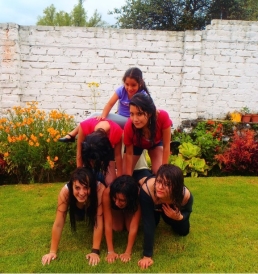
I had found my new vocation* and I wanted to learn more about brains! I spent a year studying modules in physiology*, statistics and programming, and I signed up for a masters* in Cognitive Neuroscience shortly after that. Back to Science!
I had some amazing times during those two years, and some hard times too. I was mainly based in Italy – to my disappointment.
I had always wanted to move abroad after my first experience in Ecuador, but a big family meant that I had to help at home, and I’ve always had a job alongside my studies since I was 16.
I spent six months in Germany for my master thesis*, where I did learn a lot about my project and about myself. I made some good friends in the dorms*, but the experience in the lab wasn’t exactly inclusive* – which probably caused my issue with German.
I really did get the most out of my degree and I never thought I’d do as well as I did! I was really proud of myself.
I spent six months in Germany for my master thesis, where I did learn a lot about my project and about myself. I made some good friends in the dorms*, but the experience in the lab wasn’t exactly inclusive* – which caused my issue with German probably.
I really did get the most out of my degree and I never thought I’d do as well as I did! I was really proud of myself.
Future me
I reached a point where I had my degree, I was a beekeeper, I had a disappointing experience in Germany, and I had moved from one place to another around Italy and spent a bit of time abroad during my studies.
I wasn’t sure about a PhD but I wanted to be forward-looking, so I applied for a few positions, not really taking it too seriously .
I was happy where I was, really happy. But then Covid hit.
I was one of the lucky people to live in a small village with a big field where I could breathe and spend time with my bees, and none of my loved ones were hospitalised because of Covid.
But ‘future me’ wanted more , and I got scared I would end up stuck in that valley.
So, I decided to move to Wales to pursue my passion for bees!
I’m grateful for this experience, and for being able to be part of many exciting projects, such as MFL Mentoring.
And I would do it all again in a heartbeat!
- PhD – a research-based university course which is the highest level of qualification you can get in the UK
- Scholarship – when you apply to have a course paid-for by an organisation
- Ecuador – Ecuador is located in the western corner at the top of the South American continent.
- Diplomacy – managing relations between different countries
- Internship – a short-term job offering practical experience in a professional role
- Farsi – this is the modern Iranian language spoken in Iran and Afghanistan. It is also known as Persian language
- Dialect – is a form of a language that is spoken in a particular part of the country or by a particular group of people
- Humility – Someone who has humility is not proud and does not believe they are better than other
- Vocation – is a job or occupation that one is particularly drawn to or suited to
- Physiology – this is the study of how the human body works
- Masters – an academic course you can study after completing your first degree at University
- Dorms – usually these are shared bedrooms
- Inclusive – making everyone feel they are welcome
- Esperanto – is an artificial language devised in 1887 as a way to communicate between countries
- Thesis – a really, really, really long essay!
Shifting Perspectives
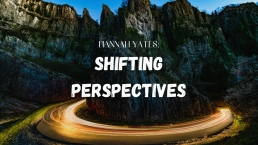
Hi everyone!
I am a little frustrated and disappointed writing this blog today. After an English lesson I taught to a group of Italian school children, I found out that they think our much-loved cheddar cheese is the feeble*, orange cheese slice found on McDonald’s burgers in Italy. How embarrassing!
This made me think about how sometimes, the true meaning of something can get lost when it moves from one country to another. Just like our cheddar cheese in Italy!
The sharing of cultures is a wonderful thing – who doesn’t love trying food from another culture?! It means we get to learn about and experience different parts of the world and sometimes, it means we get to learn about places that we would never otherwise encounter.*
But, when an iconic* British food such as cheddar cheese is not correctly understood in another culture, and it becomes a slice of bright orange, plastic, McDonalds cheese(!!), what does it tell us about what happens during this process of exchange and sharing?
Let’s look at what happens when we bring things from one culture into another.
Take pizza as an example. In the UK we generally know that a Domino’s pizza is not exactly like a standard Italian pizza.
Although we appreciate what it is, we know that if we want to try an authentic* Italian pizza, we should probably go to an Italian family-run restaurant, or Italy itself. But if we saw an authentic, Italian pizza, we’d still recognise it as a pizza, right?
So Italian Pizza, and Dominos pizza, aren’t the same thing… but they’re both pizza. What a wild concept!
But, when we were talking about cheddar, my students actually protested* when I told them that the image in front of them was cheddar cheese. They told me that it couldn’t be cheddar because it wasn’t orange.
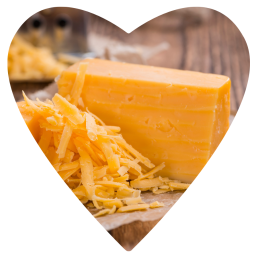
It’s clear to me that what they think of as cheddar in Italy is so far from what British people think of as cheddar, that it doesn’t really give an insight* into British food culture.
We’re seeing two different things!! Yes, we use the same name same, but are we really sharing a part of our culture, if what we see, and what they see, is a totally different thing!?
I decided that actually, the meaning of the word ‘Cheddar’ itself has been completely lost when it moves to Italy.
Although they may know the name of the cheese, very few people thataren’t from the UK know that Cheddar is the name of the place that the cheese comes from!
And, if this orange cheese by the name of Cheddar has no connection to where it originally comes from, how can we call it Cheddar cheese at all?
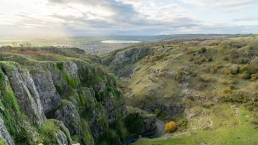
Can you think of any other examples of exported* foods that have completely lost their meaning when they’ve crossed into another country?
Or maybe you think that the sharing of cultures is more important than something getting lost in translation?* Let me know your thoughts and ideas in the comments.
Until next time, baci!
* feeble – limp, pathetic
* encounter – come across or meet
*iconic – something that is famous
*authentic – original/real
*insight – deep understanding of
*exported – send to another country to sell
*getting lost in translation – when something doesn’t make sense when it is moved to a different culture or language
School Profile: Porthcawl Comprehensive
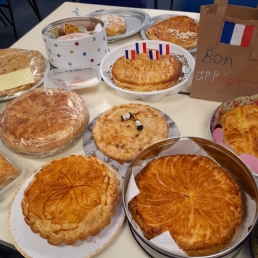
Porthcawl Comprehensive, Gaëlle Morgan
Medium: English
Location: Porthcawl
International languages: French, German
How we raise the profile of IL in our school
In Porthcawl, we are very lucky to teach both French and German.
At school, we have a Welsh club and an international languages club that I have been running for the last 15 years, where learners are able to play board games in different languages and computer games (such as Kahoot, Blooket and Quizlet) as well as chat and take part in role plays. We have also run taster language sessions in languages such as Spanish and Japanese.
We often have sixth formers taking the club which is very popular with the younger learners.
I also organise a French ‘Bake Off’ every month with a different recipe each time (such as quiche lorraine and galette des rois) and learners can win prizes and certificates. This is a very popular competition in our school.
We also have Language ambassadors (mostly GCSE learners) who run assemblies to promote IL.
Success of EDL
We celebrate European Languages Day in our school every year in September.
We organise special assemblies conducted by language learners and ambassadors from KS4 and KS5 and have whole school form class competitions, such as quizzes.
We also have a special European menu in the canteen to mark the occasion (including treats such as pain au chocolat and German sausages). We have found that all these activities greatly raise the profile of IL in our school.
Extra-curricular trips
I organised a very successful trip to the Institut Français in London in February 2022 to watch a French film in their cinema and explore the French quarters in Kensington. I highly recommend this trip and I am planning on running a similar one next year!
We are also taking 55 learners (from years 10-13) to the Lille Christmas market in December 2022. Everybody is really looking forward to the trip and it will be our fourth visit there. This trip is always extremely popular as it’s not too expensive and it’s great fun!
We are also running 2 trips to Paris and Disneyland Paris in 2023, one in March and one in April. Why? Because a huge number of learners are signing up for it and we didn’t want to disappoint anybody – we must be a bit crazy!
Promoting multi-lingualism and benefits of languages working together across the LLC
Our LLC (English/Welsh/French/German departments) are working very well together, and we have already produced and delivered triple literacy and quadruple literacy projects in our school with great success, with the majority of it rooted in the Curriculum for Wales.
Our year 6 transition is based on quadruple literacy and the origins of languages, and feedback from the primary schools and the learners is always excellent.
We also run a singing competition with year 6 transition. We split them into groups of 3: one group sings a German song, another group a French song and the third group a Welsh song. They rehearse then go on stage and compete against each other before we announce the winner. It’s really good fun!
A colleague and I are both continuing our role as Secondary Lead Practitioners for IL for the second year running. We produce resources to promote multilingualism and engagement in the classroom at KS3/4 and 5. I also worked with the IL primary sector last year by developing resources on how to engage learners in the IL classroom using oracy and links between languages. My colleague and I both run online webinars where we share our ideas on how to promote IL in both primary and secondary schools with fellow teachers.
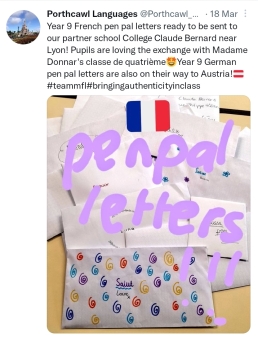
Successful strategies to improve engagement in the IL
The key is a lot of oral work as learners love speaking the language. The most popular games in our department are:
- Trapdoor
- One pen, one die
- Sentence stealer
- Battleships
Learners also love watching films in the target language so it’s nice to plan these sessions around Christmas or after a test as a reward!

